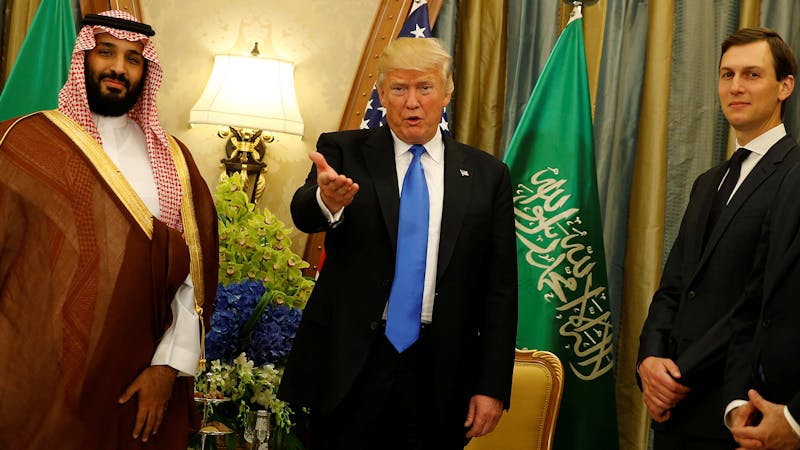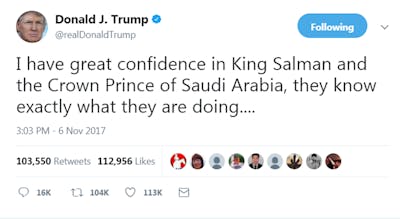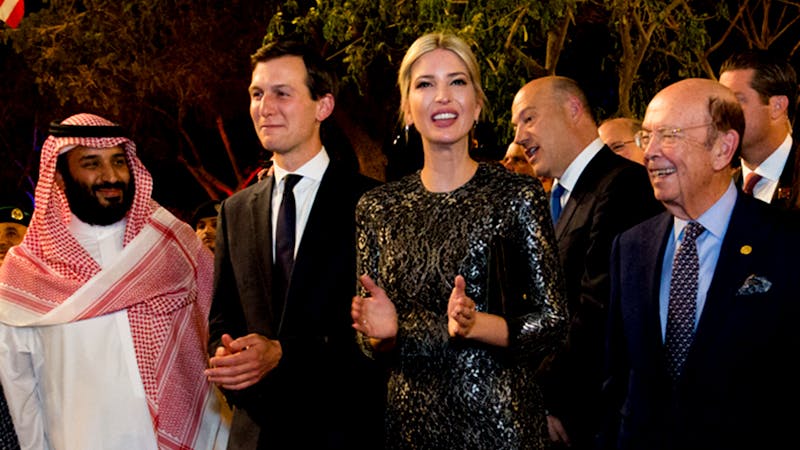A bromance that shakes the Middle East
It was in secret that Jared Kushner, son-in-law and adviser to the US president, traveled to Saudi Arabia at the end of October. The trip was not official until Kushner was on American soil again.
In retrospect, however, it has revealed what attracted Trump’s son-in-law to Saudi Arabia: A meeting with Crown Prince Mohammed bin Salman at his ranch in the desert.
It was hardly any half-hearted visit. The two influential men should have sat up till four o’clock in the morning and set up plans.

Just a few days after the nightly meeting, more than 200 people were arrested in Saudi Arabia suspected of financial crime. Among the prisoners there were at least eleven princes and one of the richest men in the world.
“They know exactly what they’re doing,” applauded Donald
r.

Two young men with magnificent plans
The trip in October was Kushners third to Saudi Arabia this year. And during the year it seems to have said “click” really between him and the crown prince. They are both in the 30’s, have powerful relatives and big plans.
Bitte Hammargren, Head of the Middle East Program of the Foreign Policy Institute, says that the two of them in common are an idea of how the Middle East should be redrawn.
“While Trump and Kushner want to throw all that Obama has overboard, such as the nuclear energy deal with Iran, Muhammad bin Salman distances from the policy that Saudi Arabia’s former king Abdullah stood for.
Instead of Abdullah’s peace plan for Israel, based on a change of country, it opens for Saudi contacts with Israel. And the former line about a pragmatic relationship with Iran is being scrapped. During Mohammed bin Salman, Saudi Arabia has broken its relations with Iran and the Crown Prince has refused to open dialogue.
“The new axis Trump-Netanyahu-bin Salman has the headline directed at Iran,” said Bitte Hammargren
He is Saudi Arabia’s new crown prince:
Word war after missile
The friendship and plans of the two kissed men shake, not least affecting the positions of what is called the cold war of the Middle East, that is, the relationship between Saudi Arabia and Iran.
The same night as the massacre in Saudi Arabia becomes known, an explosion in Riyadh is heard. It’s a ballistic robot that reaches the airport in the capital. The robot is pushed down, nobody injured, air traffic is not affected. But the war afterwards reaches new levels in the increasingly worsening relationship between Saudi Arabia and Iran.
A war action, thundered the Saudi Foreign Minister.
Take care of your own problems and do not interfere with others, responded to Iran’s president.
There are two young men who want to push the Middle East policy
The rivalry between Saudi Arabia and Iran goes a long way. When the Iranian king was overthrown in 1979, Iran became a Muslim state with strong shiadominans, which was anxious for Saudi Arabia.
Lately the conflict has been fired. Not least because of the new crown prince and his friendship with the Trumpad administration.
– With most Arab and Islamic eyes, Mohammed bin Salman shoots in his foot as he stands behind Jared Kushner and his plans for the Middle East. A Saudi normalization with Israel will not be well received in lines of Islamic and Arab countries, says Bitte Hammargren and continues:
“There are two young people who want to push the Middle East policy without taking into account the ever-multi-dimensional complexities.


Iran, with President Hassan Rouhani at the helm, approached west economically, while expanding military in the Middle East.
Iran’s strengthened position has worried Saudi Arabia, which in recent years has suffered a series of backlashes in the region.
Developments in Iraq, Syria and Yemen. Nothing has gone Saudi Arabia’s way.
Middle East’s “Cold War”
Saudi Arabia and Iran
The struggle between Saudi Arabia and Iran is sometimes called a new “Cold War”. Countries are fighting to become the strongest country in the Middle East, but instead of a direct confrontation, the battle is often happening in neighboring countries where Saudi Arabia and Iran support different sides, a so-called proxy war.
Iraq
When Iraq’s Sunni Dictator Saddam Hussein was robbed in 2003, a power vacuum was created and Iran moved its positions. At present, the relationship between Iran and Iraq is stronger than for a long time.
Syria
What began as a popular rebellion against the dictator Bashar al-Assad was fired on by Saudi Arabia and Iran from each side. Without the help of Iran-born Hezbollah, probably Bashar al-Assad’s regime had collapsed long ago. Now IS and other rebel forces, which Saudi Arabia have supported, are pushing back.
Yemen
Saudi Arabia had hoped for a quick victory when 2015 entered and supported the president of Yemen overthrown by Huthirebeller. The Huthire bells are politically supported by Iran and, according to Saudi Arabia, it is also about military support – denied by Iran. Clearly, it did not go as Saudi Arabia thought. Since the country, at the Crown Prince’s initiative, interfered with the conflict, 8,000 were killed and more than 40,000 wounded. Saudi Arabia has carried out bloody avalanches and closed Yemeni ports, resulting in the death of Yemeni by starvation and cholera epidemics.
Lebanon
The small country has often become the center of great politics. When the Lebanese prime minister announced under mysterious circumstances that he was resigned in a television broadcast from Saudi Arabia, sources in Lebanon stated that the Saudi forces forced him to resign. Saudi Arabia has accused the Lebanese government of having declared war by letting Iran-led Hezbollah get too much influence and to sit in government.
Qatar
Saudi Arabia is one of the Sunni states that isolated Qatar by opening a blockade against the country. The explanation was that Qatar “supports terrorism”. Unlike many other neighbors, Qatar has maintained relations with Iran, which is seen as a betrayal of the others.
The power struggle between Saudi Arabia and Iran has created a “whole sea storm” in the Middle East, says Bitte Hammargren. And in the pursuit of success, Mohammed bin Salman has rather created the opposite, which increases the risk of further escalation.
The heightened garden against Iran weakens those in the country who want more reform and openness while strengthening the haughty hawks.
In addition, the religious opposites have now been underpinned. Saudi Arabia is built on the most extreme Sunni ideology, which is deeply anti-Jewish, while Iran’s Allies in the Middle East are mainly Shiites.
“During the time of former King Abdullah, Iran and Saudi Arabia were able to relate to each other. But Mohammad bin Salman has put forward sectarian reasons not to contact Iran, something that digs a deeper gap.
So, Sunni and Shia differ:
Sunni and Shia
Sunni and Shia are the major divide in Islam. The battle began already with Muhammad’s death year 632 – Shia claims that the Prophet had appointed Cousin Ali to the next leader, Kalif, while Sunni thinks Muhammad did not point him out. Today, therefore, they are disagreeable about how leaders should be brought.
Sunni is by far the largest, with about 85 percent of all Muslims in the world. If you divide Christianity into faiths, Sunni Islam is the world’s largest religion, with up to 1.5 billion believers, followed by Catholicism by 1.2 billion.
Sunni therefore dominates a variety of countries, from Mauritania to the west to Indonesia to the east, although it varies very much the role of religion in society.
Shia has a dominant role in Iran, Azerbaijan, Bahrain and Iraq, and is a significant minority even in countries such as Lebanon, Yemen and Kuwait.
Sources : TT, CIA World Factbook, BBC
Show
The story of the two princes
In international media, Crown Prince Mohammed bin Salman and Jared Kushner are referred to as “the two prince” – young men with greater influence over the alliance between Saudi Arabia and the United States.
But the newfriendly friendship now risks to lead to anything but an increased calm in the Middle East.
“The building of an axis with the United States, Israel and Saudi Arabia is increasing tensions and we are seeing less dialogue,” says Bitte Hammargren, and continues:
“Mohammed bin Salman wishes a grandiose political victory when he is going to go to king, but so far he has made Saudi Arabia more unstable.
TV: The Yemenites die in silence
READ MORE: What’s happening in Saudi Arabia?
Graphics: Eva Eliasson / Lenh Duong